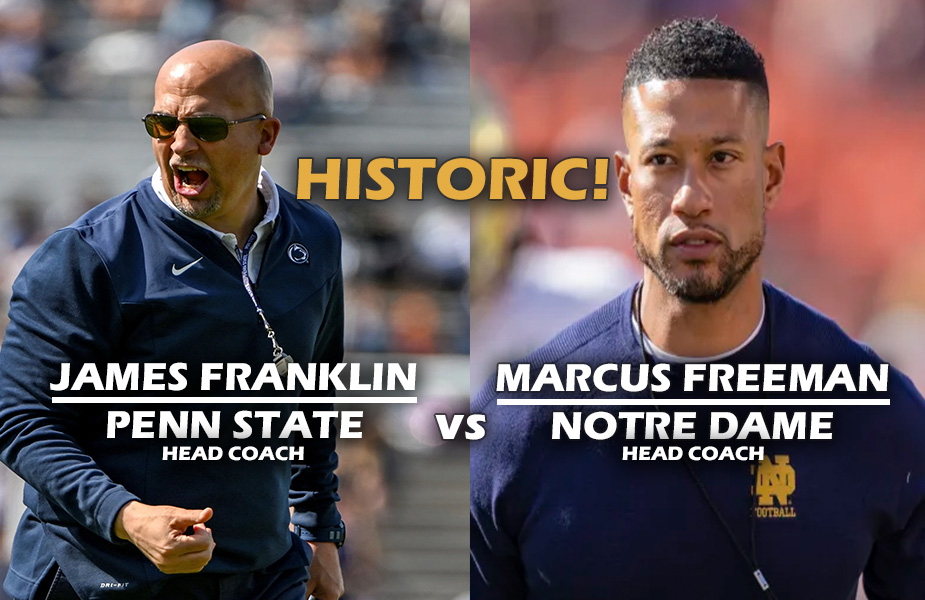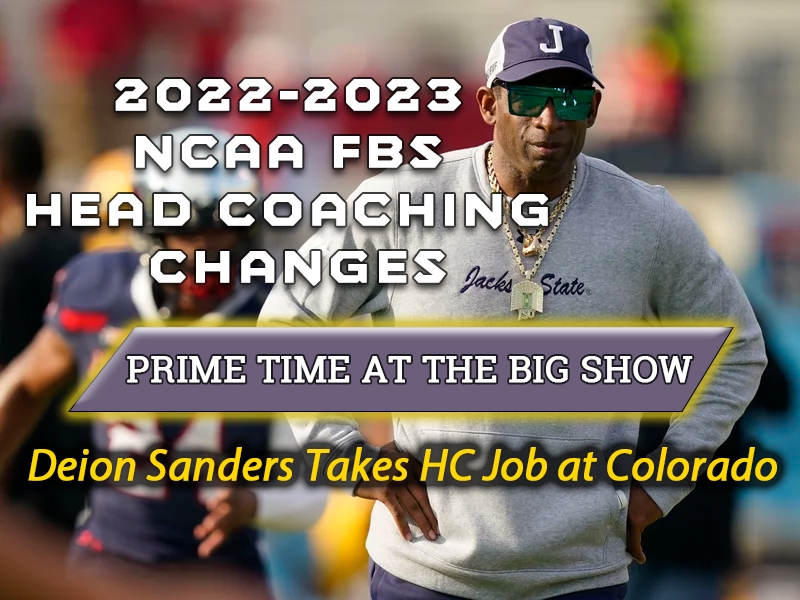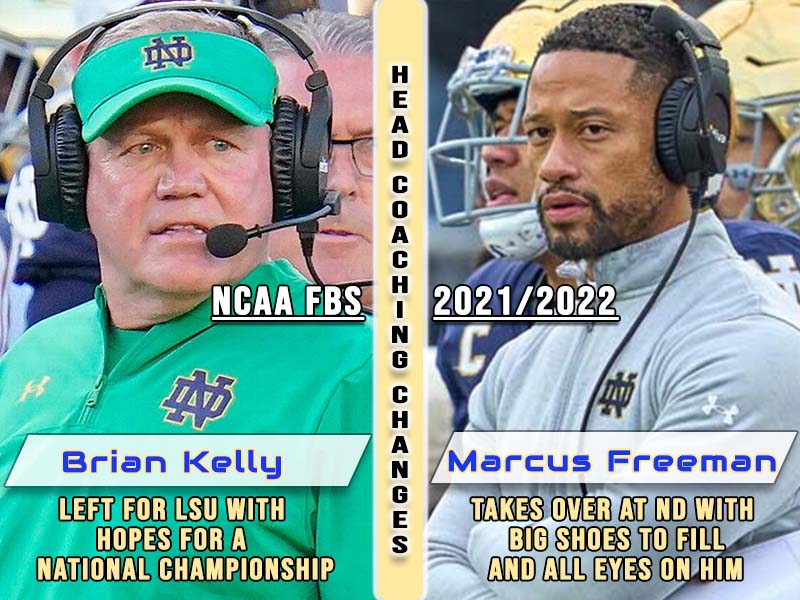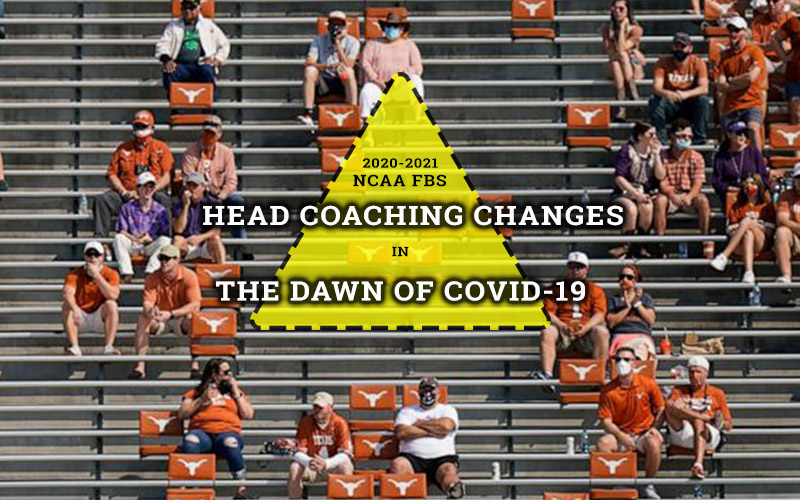Breaking the NCAA Color Barrier: Black Head Football Coaches Make History

In a moment etched in history, Penn State’s James Franklin and Notre Dame’s Marcus Freeman stand at the edge of destiny, preparing to clash in Thursday’s College Football Playoff semifinals. Two Black head coaches command teams at this level for the first time—a triumph born from generations of struggle, resilience, and unyielding defiance against systemic barriers. The winner will not just advance to the national championship game; he will carry the weight of a people’s hope and rewrite the narrative that once declared leadership at this level a privilege denied to Black men. This isn’t just a game—it’s a reckoning, a reminder that progress is not given but taken, and today, it marches boldly in front of us.
Anticipating moments like this is why I started maintaining a current List of Black Head Coaches at NCAA Division I (FBS) Schools ten years ago. However, admittedly, it is unsettling that it took this long for a Black head coach at the NCAA Division I (D1) level to achieve such a milestone, especially in an era where Black athletes have comprised well over 50% of FBS (D1) rosters for decades. At the same time, only 16 out of the 134 NCAA FBS schools have Black head coaches. The reality is clear: progress has been slow, and the shadows of exclusion still linger.
I was born well before the enactment of the 1964 Civil Rights Act that outlawed segregation and discrimination based on race, color, religion, sex, or national origin, granting Black Americans equal access to public facilities, education, and employment opportunities. As such, I have lived through much of the sordid, racist history of NCAA college football.
NCAA’s History of Segregation and Exclusion of Blacks
I remember when colleges—even in the so-called progressive North—refused to field Black players or, at best, imposed quotas to keep their numbers low. Down South, the Southeastern Conference (SEC) didn’t integrate until 1967, when Kentucky’s Nat Northington shattered the color barrier by stepping onto the field for three minutes against Ole Miss on September 30, 1967. Three minutes—that’s all it took to change history, yet it took years for that change to take hold.
Alabama and Georgia didn’t integrate their football programs until 1971—four years after Northington’s groundbreaking moment. Four years. And even then, it wasn’t acceptance of Black Players by Southern schools; it was tolerance forced by talent too undeniable to ignore. Talent that the Northern teams were beginning to exploit to the detriment of the Southern schools. Even the legendary Paul “Bear” Bryant could no longer afford to segregate his Alabama Crimson Tide team if he wished to remain competitive.
It wasn’t acceptance of Black Players by Southern schools; it was tolerance forced by talent too undeniable to ignore.
The Southern school’s commitment to keeping their programs segregated was so intense and all-encompassing that they formed what they called the “Gentlemen’s Agreement” with the Northern schools, which prohibited Northern schools from fielding “Negro” players when they played against Southern schools. This oftentimes unwritten agreement began in the early 1900s and continued to be honored—in part—into the 1960s. Today, as of January 5, 2025, there is no Black head football coach in the 16-team SEC.
Shattering the Myths That Blacks Are Not Smart Enough To Play Quarterback or to Coach
Oh, how I remember the days when the white power structure promulgated the notions that Blacks were not smart enough to play the positions of quarterback and linebacker at NCAA D1 schools or in the pros, let alone even to think they had the organizational, intellect, and leadership skills to coach at the D1 or professional level.
Today, it’s the kind of history that some blowhard right-wingers want to pretend never happened. Like racism doesn’t and never did exist in America. And if those type of white folks finally got their way, they would write slavery out of the history books entirely. Instead, they would claim it was a philanthropic period in time when benevolent whites gave employment, housing, clothing, and food to poor African immigrants. That may sound overly dramatic, but those clowns are working on future school books as you read this. There is so much they have already changed or omitted in school books and various scholastic media to whitewash and water down the truth.
The European-fabricated myth that whiteness—skin color—alone confers superiority over people of color has fallen on its face. At the same time, empirical evidence from the past few decades has also shattered the false narrative that Black athletes lack the intellect to excel as quarterbacks, linebackers, or head coaches at the highest levels of college and professional football. Unfortunately, the heavy weight of all that racist history still lives on.
Though celebrated, today’s achievements still bear the residue of delayed justice. It’s not just about coaching hires; it’s about the systems that kept Black men running, tackling, and scoring but not leading. And now that we finally see Black coaches reaching this milestone, it’s not a victory lap—it’s a checkpoint in a journey that should have started long ago.
And now that we finally see Black coaches reaching this milestone, it’s not a victory lap—it’s a checkpoint in a journey that should have started long ago.
The Shared Sacrifices of Blacks and Whites Towards a More Perfect Union
From 250 years of slavery, requiring a bloody Civil War to end it, to another century of legal oppression and sanctioned discrimination, dismantled only through the fire and sacrifice of the Civil Rights Movement, Black Americans have risen time and again to shatter the barriers meant to keep us bound. But let it be clear—we did not march this road alone. The righteous conscience of white abolitionists, fearless allies, and civil rights warriors who stood, spoke up and bled beside us also helped make this progress possible. So, when white folks see those two college football teams lined up along the sidelines on Thursday night—led by Black coaches—you should feel the same pride that Black folks feel. Because this moment isn’t just ours—it’s a shared triumph, a testament to what America can achieve when courage and conviction walk hand in hand. The conviction to truly live up to those words in the Declaration of Independence—“that all men are created equal, that they are endowed by their Creator with certain unalienable Rights, that among these are Life, Liberty and the pursuit of Happiness.”
Looking Forward: There Are Troubling Days Ahead
Those words in the Declaration of Independence have been the force and guiding light of racial and gender progress in America. Ironically, either Franklin or Freeman will become the first Black head coach to appear in an NCAA D1 college football championship game on the evening of January 20, 2025—the same day Donald J. Trump takes office again as the 47th President of the United States of America. I mention this because Trump ran a presidential campaign vowing to eliminate diversity, equity, and inclusion initiatives (DEI), affirmative action, and civil rights protections across the board. These are the types of things that helped make Franklin and Freeman’s journey possible.
Let’s face the truth, America; there is a large contingent in the MAGA movement that believes America was founded by and is for white people. Furthermore, they think whites should always maintain a “privileged status” among the races. Some of these people will have influential positions in the Trump administration. Those white nationalist forces are not something new—they have always been with us since the foundation of the United States. It’s up to all of us who believe in the force and light of those words in the Declaration of Independence to continue to make their attempts impotent as we continue the march toward a more perfect Union for all.
For we are on the brink of a twilight unlike any in American history—a moment where authoritarianism, oligarchy, and white nationalism converge to reshape this nation into something unrecognizable, a betrayal of the very ideas of the Declaration of Independence—the essence of what makes America a beacon of light and hope to the world.
Stay vigilant, and may the force of justice and the light of truth prevail once more.
Finally, congratulations and good luck to Coach Franklin and Coach Freeman. I can only hope the contest winner among you two gets to hold the trophy in victory after their College Football Playoff championship game.
Related Links
List of Black Head Coaches at NCAA Division I (FBS) Schools
2024-2025 NCAA FBS Head Coaching Changes: Bill Belichick Is Back!



